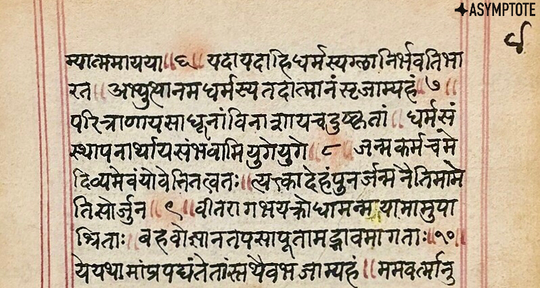Today’s post is the first installment in our new blog series, “Classic Texts in Translation,” in which we speak with scholars and experts about the challenges of translating canonical texts from around the world. In today’s interview, Assistant Blog Editor Nina Perrotta talks with Professor David Buchta of Brown University about the Bhagavad Gītā, an ancient Sanskrit text that forms part of the larger epic poem known as the Mahābhārata. Their conversation touches on the specific difficulties of translating complex philosophical and theological terms from Sanskrit into English, the questions around authorship that make interpreting classical Sanskrit texts particularly challenging, and the reasons that the Bhagavad Gītā has been such an influential text, both within India and around the world, for millennia.
Nina Perrotta (NP): I want to start off by asking you, in a general way, about some of the biggest challenges of translating Sanskrit into English.
David Buchta (DB): Sure. In some ways, it’s a hard question to answer in a general way, just because you’re talking about this language that has such an enormously long history, such a huge library of literature, and such a wide range. This would be the same for Latin or Greek—the kinds of challenges you face in one genre versus another are going to be radically different.
On the one hand, you’ve got these poems that have two meanings simultaneously, and that obviously is going to introduce one whole set of translation challenges. I often say this about Sanskrit: it’s such a highly cultivated language. In other words, the people who used the language cared about it, thought about it, put their time and energy into developing its toolbox. As a result, if you’re a skilled writer, you can, if you want to, be extremely precise and unambiguous, or you can be extremely ambiguous. There are these poems where you can tell seven stories all at once. It just depends on how the words are interpreted, whether the same sequence of syllables is broken into two words or three words, for example. You have these different ways that you can go if you’re skilled enough at using the language.

